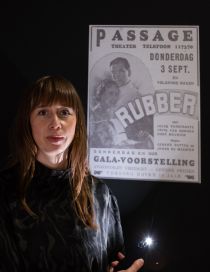Installation 'Removed' by Sabine Groenewegen
16 May t/m 2 June 2024
Location: Stroom Den Haag, Hogewal 1-9, Den Haag
Open: Wednesday until Sunday: 12:00 - 17:00 hrs
As a result of the event Positions Afterlives x Sabine Groenewegen on 16 May 2024, Stroom is currently presenting the video Removed (2022) by Sabine Groenewegen.
In 1931 Madelon Székely-Lulofs published a novel titled Rubber, based on her experiences as a planter's wife living on a rubber plantation in the North of Sumatra. Lulofs created a character named Kiku San: an Asian woman in 'domestic service' of a Dutch planter. In doing so, she exposed the commonplace system of concubinage in which Asian women were treated as disposable property. She made visible what she observed as 'a woman who supposedly doesn't exist.' The novel expressed critique on the treatment of indentured contract laborers, who under the Coolie Ordinance of the Dutch colonial government were exploited within a system of slavery. Rubber became one of the most internationally successful Dutch novels to date. The rubber planters expressed their annoyance about the book in the press.
A few years later, Dutch film director Gerard Rutten bought the film rights of the book Rubber and set off to Sumatra with a crew. The rubber planters intended to boycott the film production, but Rutten won them over with the promise that he would not depict them in a critical light. He casted actress Amsy Moina (daughter of a Javanese woman and Dutch man) for the role of Kiku San.
The film Rubber premiered in the Passage Theatre Cinema in The Hague in 1936. The planter community and Colonial Ministry were satisfied by the films' celebratory framing of the colonial project. The press praised Amsy Moina for her moving depiction of Kiku San. However, at some point the character of Kiku San was removed from the only distribution copy of the film for unknown reasons. Taking an interest in the career of Amsy Moina, artist Sabine Groenewegen discovered her disappearance from the movie. She started to investigate what exactly had been removed. During her research she found a forgotten dialogue list, which allowed Groenewegen to reconstruct the missing scenes.
The discovery of this script was the departure point for the work Removed (2022), which shows six women silently reading the script of the deleted scenes and then describing the scenes in their own words. By reconstructing the scenes solely through the subjective descriptions, the work resists the violence of the original fiction and provides a glimpse of how hidden gender violence passes from generation to generation.
- 16 May '24 - 02 Jun '24
- Stroom Den Haag, Hogewal 1-9, Den Haag


















